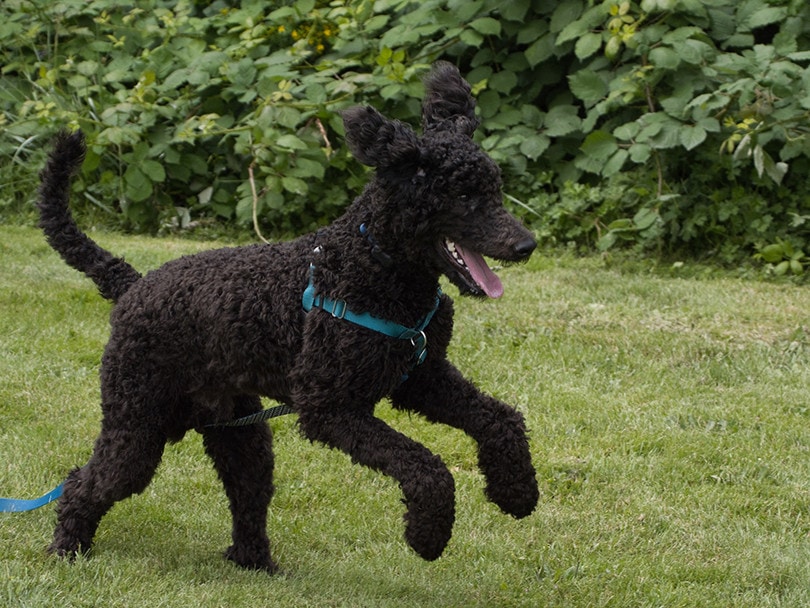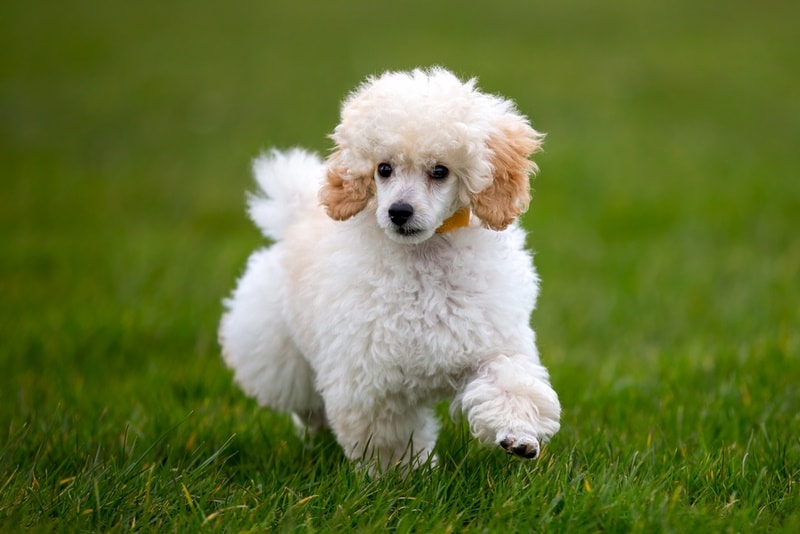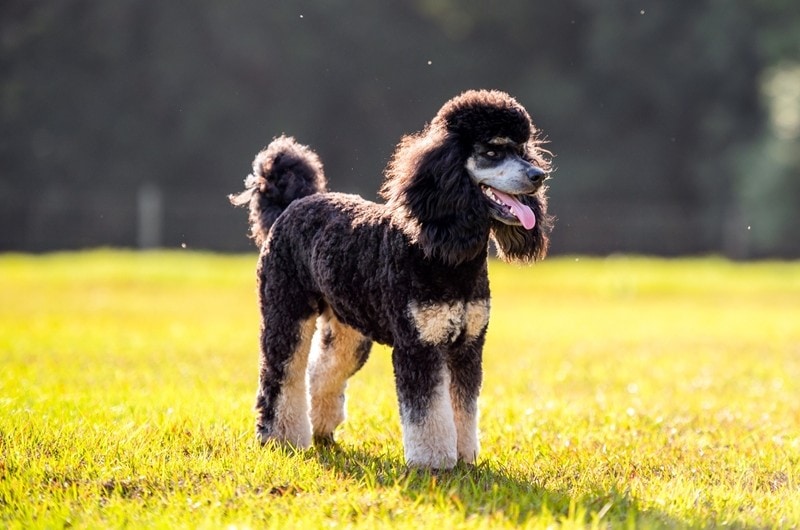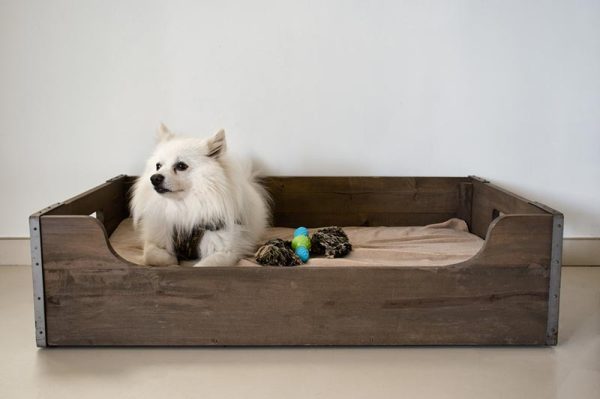Poodles are easily among the most easily recognizable dogs on the planet! Almost everyone is familiar with their soft curly coats and poofy tails! But did you know that these famous pups come in various sizes and are incredibly intelligent? The Poodle is one of the smartest breeds and is known for being easy to train. Their elegant lines, super athleticism, and stunning intelligence also make them incredibly popular.
That said, these gorgeous dogs require plenty of attention from their human companions to stay well-behaved. Unhappy Poodles will often bark excessively, and some can become aggressive toward strangers. Fortunately, with the proper training and socialization, this breed won’t lean into negative behaviors and will make an excellent pet.
Since they’re so intelligent and easy to train, Poodles often work as guide, therapy, and service dogs. Read on to learn more about the breed’s most common personality traits, temperament, and behavior.

A Brief Introduction to the Breed
Poodles are active, intelligent dogs with ropy, curly hair that’ll naturally mat but does not shed, which is why the breed is a great choice for allergy sufferers.
They come in a variety of colors, including white, silver, brown, black, gray, and blue, though white tends to be the color most associated with this dog. There are three sizes for this breed: standard, miniature, and toy. Standard Poodles are more than 15 inches tall and weigh anywhere from 45 to 70 pounds. Toy variants are typically less than 10 inches tall and can weigh up to 7 pounds.
All three sizes have square bodies, graceful necks, and elegant long legs. The breed first emerged in Germany during the 1600s, where they were bred as water retrievers. The famous Poodle haircut was, in fact, developed to keep the dogs’ joints and vital organs warm in cold, wet conditions.
Poodles Are Extremely Active
Most Poodles are nonstop bundles of energy. Standard and miniature dogs need at least 60 minutes of exercise per day to remain happy and healthy. Toy versions require a bit less activity and are usually okay with 30–45-minute daily walks.
Poodles that don’t get enough exercise can become hyper and neurotic, a tendency that’s particularly pronounced in the toy variety. Daily long walks and occasional games of fetch can hit the sweet spot regarding exercise. Poodles of all sizes love outdoor activities and can swim like champs. They were bred to retrieve waterfowl, after all! As accomplished jumpers, they also have a knack for evading fenced enclosures.
If they don’t get enough daily activity, they’re prone to weight gain, depression, and destructive behavior. Poodles are also inclined to engage in nuisance barking when bored or anxious.

Poodles Are Incredibly Sensitive
Poodles love spending time with humans. They bond deeply with their human family members and require lots of attention. Otherwise, they can become extremely neurotic, which can result in nuisance barking and hyperactivity. Since they’re sensitive to human emotions, Poodles often suffer from high anxiety levels.
Just hanging out with these intelligent dogs won’t cut it in the attention department. They need to spend time interacting directly with their owners. Toy Poodles are the most likely to exhibit negative anxiety-driven behaviors; they’re often described as incredibly sensitive. Without serious obedience training starting in puppyhood, Toys tend to become aggressive when anxious, which often manifests as growling and nipping. They’re also frequently unwelcoming and standoffish toward people they don’t know.
All members of the breed are protective of their human companions. Most don’t make great guard dogs, but they’ll definitely bark to announce visitors.
Poodles Are Prone to Separation Anxiety
Since Poodles are so social and intelligent, they require a ton of attention. They don’t do well when left alone for long periods. Poodles left to fend for themselves for too long often develop separation anxiety, having full-blown panic attacks when left alone. Dogs suffering from separation anxiety often bark incessantly, pace, drool, pant, and go to the bathroom inside the house.
Other common indicators of separation anxiety include destructive behavior and repeated escape attempts that sometimes result in serious injuries. While veterinarians aren’t entirely sure what causes some dogs to develop separation anxiety, stress and environmental disruptions play essential roles in triggering the condition. Some breeds, including Poodles, are more likely to experience anxiety than others.
Mild separation anxiety can sometimes be addressed through counterconditioning—essentially, the process of teaching your dog to associate your departure with something pleasant, like a tasty treat. More severe cases often require medication or behavioral therapy.

Poodles Are Incredibly Intelligent
Poodles are bright and bore easily when not provided with sufficient mental stimulation. This wicked intelligence is one of the reasons these dogs don’t do well when left alone for long periods. Poodles of all sizes thrive on training. Obedience training is essential for this breed, as they’re inclined to challenge their owners if left to their own devices.
Agility training offers mental stimulation while meeting the breed’s serious need for physical activity. Poodles learn incredibly quickly and have a reputation for being extremely easy to train and eager to learn. Many pick up new commands after only a few repetitions.
Since they’re so sensitive, though, it’s critical to train Poodles using positive reinforcement. They quickly become anxious when exposed to loud noises, including raised voices, and often become withdrawn when spoken to harshly.
Poodles Love to Jump and Beg and Sometimes Don’t Listen
Since these dogs have so much energy and become excited quickly, they often exhibit overly enthusiastic behaviors, such as jumping. Without proper obedience training, the canines can become determined beggars capable of turning mealtimes into nightmares.
Poodles are also known for their stubborn streaks. A poorly trained Poodle can quickly become virtually impossible to control. Many unneutered males of all sizes mark their territories, and both male and female dogs sometimes exhibit mounting behavior. This breed also has a reputation for clinginess, particularly when young.
While having a Poodle shadow may be annoying at times, it’s usually a sign that your dog enjoys being around you. Standard Poodles are considered the mellowest of the bunch and the least likely to exhibit challenging behaviors. These large dogs typically have less nervous energy and are better with children than the miniature and toy variants.


Final Thoughts
Poodles make lovely pets for those willing to spend the time required to keep these intelligent dogs happy. These curly-haired darlings need plenty of exercise and attention to be their best selves. Poodles that don’t get enough mental stimulation or physical activity can become anxious, nervous, and prone to annoying behavior, such as jumping and incessant barking.
Toy variants tend to be more inclined to exhibit anxiety-driven behaviors, including nipping. All Poodles are acutely sensitive to their owners’ emotional states, often becoming outright depressed if exposed to too much tension between household members.
See also:
Featured Image Credit: Tanya Consaul Photography, Shutterstock






















